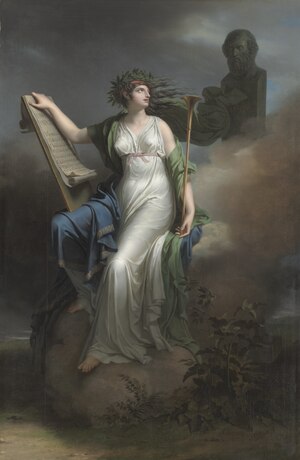Epic Poetry: Difference between revisions
No edit summary |
(Added bibliography and a quick template for additions.) |
||
| (29 intermediate revisions by 3 users not shown) | |||
| Line 1: | Line 1: | ||
[[File:Charles Meynier - Calliope, Muse of Epic Poetry - 2003.6.4 - Cleveland Museum of Art.tiff|Charles Meynier, ''Calliope, Muse of Epic Poetry''|thumb]] | |||
An '''epic''', or '''heroic''', is a long narrative poem told in a formal style about a serious subject that relates to the a specific national identity.{{sfn|Abrams|2005|p=81}} | |||
==History== | |||
. . . | |||
==Conventions== | |||
. . . | |||
==Characteristics== | |||
. . . | |||
==Resources== | |||
* [[w:Epic poetry|Epic poetry]] on Wikipedia. | |||
==Citations== | |||
{{Reflist|15em}} | |||
==Bibliography== | |||
{{refbegin|indent=yes|30em}} | |||
* {{cite book |last=Abrams |first=M. H. |date=2005 |chapter=Epic |title=A Glossary of Literary Terms |url= |location=Boston, MA |publisher=Thomson, Wadsworth |pages=81–84 |author-link= }} | |||
* {{cite book |last=Cuddon |first=J. A. |date=1979 |title=A Dictionary of Literary Terms |url= |location=London |publisher=Penguin }} | |||
* {{cite book |last1=Frye |first1=Northrup |last2=Baker |first2=Sheridan |last3=Perkins |first3=George |last4=Perkins |first4=Barbara M. |date=1997 |title=The Harper Handbook to Literature |url= |location=New York |publisher=Longman }} | |||
* {{cite book |last=Frye |first=Northrup |author-mask=1 |date=2015 |orig-year=1957 |title=Anatomy of Criticism |url=https://books.google.com/books?id=jmkZBgAAQBAJ |location=Princeton, NJ |publisher=Princeton University Press }} | |||
* {{cite book |last1=Harmon |first=William |last2=Holman |first2=Hugh |date=2003 |title=A Handbook to Literature |edition=Nineth |url= |location=Upper Saddle River, NJ |publisher=Prentice Hall }} | |||
* {{cite book |last=Hexter |first=Ralph |date=1993 |title=A Guide to the Odyssey |url= |location=New York |publisher=Vintage }} | |||
* {{cite book |editor-last=McArthur |editor-first=Tom |date=1992 |chapter=Epic |title=The Oxford Companion to the English Language |url= |location=Oxford |publisher=Oxford UP |page=376 |isbn=|author-link= }} | |||
* {{cite book |last=Parrander |first=Patrick |date=1980 |chapter=Science Fiction as Epic |title=Science Fiction: Its Criticism and Teaching |url=https://books.google.com/books?id=PZsOAAAAQAAJ |location=London |publisher=Methuen |pages=88–105 |isbn= |author-link= }} | |||
* {{cite book |last=Tillyard |first=E. M. W. |date=1966 |orig-year=1954 |title=The English Epic and Its Background |url=https://books.google.com/books?id=dvlZAAAAMAAJ |location=New York |publisher=Oxford UP }} | |||
* {{cite book |last=Wilkie |first=Brian |date=1965 |title=Romantic Poets and Epic Tradition |url=https://books.google.com/books?id=xJYnAAAAMAAJ |location= |publisher=University of Wisconsin Press }} | |||
{{refend}} | |||
[[Category:Literary Terms]] | |||
Latest revision as of 09:19, 2 August 2021
An epic, or heroic, is a long narrative poem told in a formal style about a serious subject that relates to the a specific national identity.[1]
History
. . .
Conventions
. . .
Characteristics
. . .
Resources
- Epic poetry on Wikipedia.
Citations
- ↑ Abrams 2005, p. 81.
Bibliography
- Abrams, M. H. (2005). "Epic". A Glossary of Literary Terms. Boston, MA: Thomson, Wadsworth. pp. 81–84.
- Cuddon, J. A. (1979). A Dictionary of Literary Terms. London: Penguin.
- Frye, Northrup; Baker, Sheridan; Perkins, George; Perkins, Barbara M. (1997). The Harper Handbook to Literature. New York: Longman.
- — (2015) [1957]. Anatomy of Criticism. Princeton, NJ: Princeton University Press.
- Harmon, William; Holman, Hugh (2003). A Handbook to Literature (Nineth ed.). Upper Saddle River, NJ: Prentice Hall.
- Hexter, Ralph (1993). A Guide to the Odyssey. New York: Vintage.
- McArthur, Tom, ed. (1992). "Epic". The Oxford Companion to the English Language. Oxford: Oxford UP. p. 376.
- Parrander, Patrick (1980). "Science Fiction as Epic". Science Fiction: Its Criticism and Teaching. London: Methuen. pp. 88–105.
- Tillyard, E. M. W. (1966) [1954]. The English Epic and Its Background. New York: Oxford UP.
- Wilkie, Brian (1965). Romantic Poets and Epic Tradition. University of Wisconsin Press.

